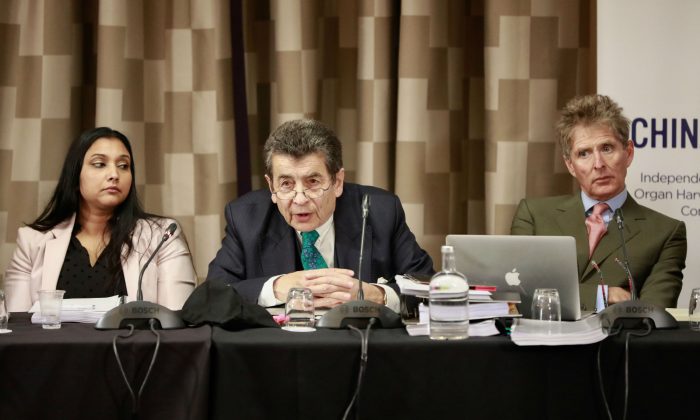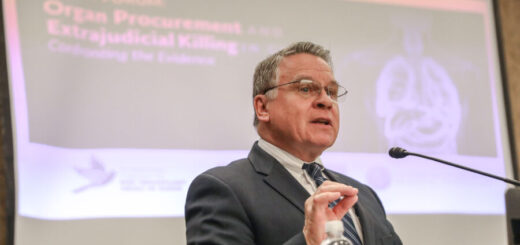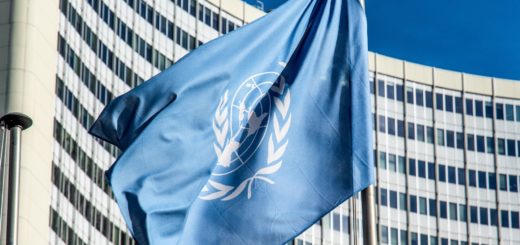
Membrul tribunalului Regina Paulose (S), președintele tribunalului Sir Geoffrey Nice QC (C), membrul juriului Nicholas Vetch la prima audiere din aprilie din 6 aprilie 2019. (Simon Gross)
SHORT FORM of THE CHINA TRIBUNAL’S JUDGMENT
In December 2018 The Tribunal issued an interim judgement:
Since then, the Tribunal has contended with a pervasive culture of secrecy, silence and obfuscation by the PRC relating to much material that could have helped in the determination of whether forced organ harvesting has occurred in China. The Tribunal is neither deterred nor disabled from reaching a proper conclusion on the evidence that is available.
China’s reputation as a gross human rights abuser has not had a bearing on the Tribunal in reaching a proper conclusion. The Tribunal has adopted a process for its work that safeguards an even-handed approach to the Peoples Republic of China’s (PRC) interests. The Tribunal has requested contributions from the PRC at every stage.
The Tribunal has considered evidence, in its many forms, and dealt with individual issues according to the evidence relating to each issue and nothing else and thereby reached a series of conclusions that are free of any influence caused by the PRC’s reputation or other potential causes of prejudice.
These were as follows;
- That there were extraordinarily short waiting times (promised by PRC doctors and hospitals) for organs to be available for transplantation;
- That there was torture of Falun Gong and Uyghurs;
- That there was accumulated numerical evidence (excluding spurious PRC data) which indicated:
- the number of transplant operations performed, and
- the impossibility of there being anything like sufficient ‘eligible donors’ under the recently formed PRC voluntary donor scheme for that number of transplant operations;
- That there was a massive infrastructure development of facilities and medical personnel for organ transplant operations, often started before any voluntary donor system was even planned;
That there was direct and indirect evidence of forced organ harvesting.
These individual conclusions, when combined, led to the unavoidable final conclusion that;
The Tribunal considered whether this constituted a crime of Genocide;
The Falun Gong and the Uyghurs in the PRC each qualify as a ‘group’ for purposes of the crime of Genocide.
For the Falun Gong, the following elements of the crime of Genocide are clearly established:
- Killing members of the group;
- Causing serious bodily or mental harm to members of the group.
Thus, bar one element of the crime, Genocide is, on the basis of legal advice received, clearly proved to the satisfaction of the Tribunal.
The remaining element required to prove the crime is the very specific intent for Genocide.
The Tribunal wishes to point out that specific intent does not necessarily make a crime of Genocide worse in real wickedness than an individual Crime Against Humanity proved by the same set of facts.
The Tribunal notes that forced organ harvesting is of unmatched wickedness even compared – on a death for death basis – with the killings by mass crimes committed in the last century. There is justifiable belief in the minds of some or many – rising to probability or high probability – that Genocide has been committed.
In line with this, and by considering the evidence and the law, there can be no doubt that there is a duty on those who have the power to institute investigations for, and proceedings at, international courts or at the UN to test whether Genocide has been committed. They should act immediately to determine accountability for any acts contrary to the provisions of the Genocide Convention.
In regard to the Uyghurs the Tribunal had evidence of medical testing on a scale that could allow them, amongst other uses, to become an ‘organ bank’. The world is already watching their interests and their geographical location – although very large – may render it possible to lend them support more easily than for the Falun Gong who are dispersed throughout the country.
Governments and international bodies must do their duty not only in regard to the possible charge of Genocide but also in regard to Crimes against Humanity, which the Tribunal does not allow to be any less heinous. Assuming they do not do their duty, the usually powerless citizen is, in the internet age, more powerful than s/he may recognise. Criminality of this order may allow individuals from around the world to act jointly in pressuring governments so that those governments and other international bodies are unable not to act.
- Rome Statute of the International Criminal Court 1999, Article 7(1)(a).
- Rome Statute of the International Criminal Court 1999, Article 7(1)(b) and Article 7(2)(b).
- Rome Statute of the International Criminal Court 1999, Article 7(1)(e).
- Rome Statute of the International Criminal Court 1999, Article 7(1)(f) and Article 7(2)(e).
- Rome Statute of the International Criminal Court 1999, Article 7(1)(g).
- Rome Statute of the International Criminal Court 1999, Article 7(1)(h) and Article 7(2)(g).
- Rome Statute of the International Criminal Court 1999, Article 7(1)(i) and Article 7(2)(j).
Governments and any who interact in any substantial way with the PRC including:
-
- Doctors and medical institutions;
- Industry, and businesses, most specifically airlines, travel companies, financial services businesses, law firms and pharmaceutical and insurance companies together with individual tourists,
- Educational establishments;
- Arts establishments
should now recognise that they are, to the extent revealed above, interacting with a criminal state.
17th June 2019



